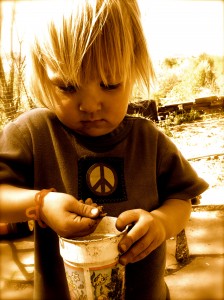I often have women come see me who consistently report that the men in their lives are stuck, unhappy, and unwilling to do anything about it. The only time I see those types of men is when their lives and relationships start to fall apart.
Why is this?
Are men just lame? clueless? Just guys? Do we really only care about sports, boobs, gadgets and cars? Or is there more to the story?
Men are falling dramatically behind women (here’s a study backing this up, and some other data here). And boys are falling dramatically behind girls in education (Somewhat conflicting info here with some reports saying it’s still a level playing field, and others saying the way schools are set up is more suited to girl learning styles and not really suited to handle the way boys learn).
Despite what these studies show, my own experience says this: Generally speaking, men are limping along while women are kicking ass.
Why?
Most of the research out there points to schooling. That boys simply learn differently than girls and that schools, by in large, support learning styles and environments that favor girls.
This is all great and I can get behind a lot of it. However, the “experts” are missing a critical element that starts from birth onward.
My theory?
The boy code: Boys are trained out of their natural essence and expected to adhere to what William Pollack describes as the boy code. Michael Kimmel takes the idea further in his book Guyland and speaks about how men remain boys stuck in “guyland.”
Our entire culture supports boys to abandon themselves and their true essence.
We men have been conditioned to be the way we currently are. We were conditioned out of our intuition, emotions, felt sense, and our relational capacity. Believe it or not, men are as sensitive as women and as capable relationally.
Yet because of our culture and the stifling boy code, we have been trained not to be this way. I also understand part of this conversation is about nature (biology) and that men are VERY different from women in endless ways (which I celebrate), but I’m not going to talk about nature. Nurture is something I can do something about so that’s where my attention is.
My attention is on how boys and men are trained to be emotionally shut down and disconnected from themselves.
When I look around at teenage boys and young men I feel scared. Most are lost, disconnected, and pissed off, rightfully so.
Here is my master’s paper on the subject from 2005. This excerpt begins on page seven of my 40 page paper. (you might also want to read my post “Why many men are still boys and what can be done about it). I have added a few new thoughts below the excerpt.
——————————————
Infancy, the beginning of disconnection
The kind of man a boy grows into is laid down in early childhood development. His earliest relationships strongly dictate how a boy will be in relation to his world. If a boy’s feelings and emotional needs for closeness and connection are not recognized and valued or they are neglected or abused, he will most likely begin to disconnect from himself and have significant issues with trust (Ewen, 1998).
William Pollack Ph.D. (1998), a leading researcher in male behavior, believes the conditioning of acceptable male behavior begins as early as infancy. He cites research at Rutgers University, which showed that mothers attempted to sooth their infant boy by responding with encouragement to happy emotions while “discouraging more unhappy emotions” (p. 40). This conditioning slowly stifles a boy’s emotional expression and gives him strong messages over time of how to be in the world: to be okay, he cannot trust his internal experience and he needs to behave in an acceptable way. The boy will mistrust his true self and begin to form a false self based upon what his environment and caregiver support. Herein lies the root of man’s disconnection.
The Boy Code and further disconnection
The acceptable behavior a boy begins to live by is what Pollack (1998) calls the “boy code.” The boy code “is a set of behaviors, rules of conduct, cultural shibboleths, and even a lexicon, that is inculcated into boys by our society—from the very beginning of a boy’s life” (p. xxv). Within the boy code are countless introjects. Introjects are messages that a person takes in from their environment without a lot of thought or discernment. The boy code teaches boys several introjects: “Don’t be like a girl,” “don’t be too tender or close with other boys,” “act like a man,” and “don’t be a mama’s boy.” Adding to their confusion in a world of feminist thought, men also hear “don’t be like most men,” or, from a mother in a family with an absent or abusive father, “don’t be like your father.” Several of these introjects will be addressed in the pages that follow.
The “Gender Straightjacket”
James A. Doyle (1983), author of The Male Experience suggests that the first lesson in the boy code is “Don’t be like a girl” (p. 161). Instead of being taught how to be, boys are taught how NOT to be, “what girls do, boys don’t” (p. 150). Doyle (1983) believes this is the root of misogyny and sexism because boys believe that girls and women are, “unequal, bad and inferior” (p. 150). How many grown men in a patriarchal society hold this same childhood teaching? The boy code confuses the young boy because it splits off his inner experience of self (emotions and feelings) from an outer one that is based on cultural norms and expectations (boy code), thus increasing the disconnection. He is bombarded with more messages such as “don’t be a baby,” “don’t be a wimp,” “ don’t be a sissy,” “don’t feel your feelings.” The boy begins to take in these introjects all the while feeling ashamed of his authentic, internal experience. Over time, a boy will slowly shut down his inner world in the service of doing what’s expected. Pollack (1998) believes that by doing this, society is placing a boy into a “gender straightjacket” (p. 40). This gender straightjacket constrains boys and men to behave in socially accepted ways based upon their gender. Pollack (1998) and men’s writer Loren Pedersen (1991) agree that this confusion ultimately wears a young man down and may later bring on depression, failed relationships, emotional staleness or even suicide. The confusing introjects a boy will receive do not stop there.
Relationship with Mother
Since most men are raised by their mothers (in the midst of absent, abusive or emotionally unavailable fathers), this relationship is paramount for how a boy will do relationship later in life (Doyle, 1983). Somewhere along the line, a boy will hear the message “don’t be a mama’s boy,” which implies that he is too close, affectionate or clingy with his mother. Pollack’s research shows that a young boy actually does not want to be apart from his mother and that disrupting a boy’s desire to stay connected to his mother is “devastating” and “traumatic” (1998, p. 27). Pollack adds, “If a boy had been allowed to separate at his own pace, that longing and sadness would not be there, or would be much less” (1998, p. 27). Pollack (1998) also believes that the roots of shame a man feels can be traced back to this premature separation. Doyle (1983) agrees and adds, “In our culture, boys are socialized earlier into their sex role and pushed away from parental dependencies earlier than girls are” (p. 95). Unfortunately a nurturing father is often not available when the boy separates from his mother, so boys will seek the guidance and support of their peer group (Doyle, 1983). A boy’s relationship with his mother is often his only emotional connection. What about his father and how does this relationship impact a boy’s disconnection?
Relationship with Father
Whatever role his father plays will have a lasting impact on the boy. Most commonly, a boy’s father is the person who turns away or shuts down the boy’s emotions. If his father is around, he may make fun of his son if he is clinging to his mother. Fred R. Gustafson (1997), writing about father-son dynamics, believes that a young man will have a limited and warped sense of masculinity when the father-son relationship is unhealthy and the father is unavailable. Gustafson (1997) identifies this as having “terrible” consequences such as an ill-defined ego structure, a limited male identity, being controlled by women through guilt and feelings of inadequacy. Gustafson (1997) believes that the reason “there are so many angry men today…is not only because they have been discouraged from having or expressing feelings, but also because they have not felt a significant loving father presence in their lives” (p. 167).
Male Friendships and Homophobia
How emotionally close are male-male friendships? As stated earlier, often the only emotional connection a boy has is with his mother. Men have learned relationships from single mothers, female partners, sisters and women who are stereotypically more capable of sharing emotions, feelings and relating in general. Yet if a boy is not allowed to be close with his mother or his father, what makes him want to be close with his male friends? Doyle (1983) writes that boys are simply not allowed to publicly express most emotions for fear of being seen as or labeled weak, feminine, too vulnerable, or gay. Not only are boys not supposed to be close and express feelings with their mother or father, boys are given a clear message that they should not be too close with another boy (Doyle, 1983). According to Doyle (1983), two of a boy’s biggest fears are being labeled feminine or gay. This is not just an experience boys have; it is pervasive in the adult male population as well. Later in life Doyle adds, “men cannot allow themselves to get too close, to form deep and intimate friendships with other men because they may have to deal with the gnawing fear of homosexuality” (p. 160). When they grow older, men fear that their male peers will judge them as unmanly. Doyle (1983) cites Gregory Lehne who views the fear of homophobia as “a device of social control directed specifically against men to maintain male behavior appropriate to the social situation” (p. 159). A consequence of this fear is that few men end up having close male friends (Doyle, 1983). Furthermore, few men end up having a close relationship to themselves.
Toward Manhood
As a boy grows toward other developmental tasks, more messages are delivered about how to be in the world all too often with the result of more disconnection. “The primary tasks of adolescence, according to all contemporary notions, are self-definition, identity formation, differentiation” (Raphael, 1998, p. 197).
More confusing introjects of the boy code include, “suck it up and be a man,” or conversely from a world of feminine upbringing, “don’t be like most men,” and from a mother estranged from an absent or abusive husband, “don’t be like your father.” Pollack (1998) writes that, “Without being aware of doing so, society is judging the behavior of boys against outmoded ideas about masculinity and about what it takes for a boy to become a man” (p. xxiv). Writer of the need for men’s rites-of-passage in this culture, Ray Raphael (1988) adds, “Contemporary society seems to give us differing and conflicting definitions of what manhood is and how it might be achieved” (p. 22). Adult men will often continue to grapple with their emotions and feelings throughout life.
Rarely do other men support each other’s vulnerabilities and feelings. What do men do? They continue to wear a mask that states “everything’s fine” (Pollack, 1998). Pollack (1998) also maintains that teenage boys become experts at masking their true selves because they feel ashamed of their vulnerability. Similarly, Sam Keen (1991), best selling author of Fire in the Belly, believes that man avoids his own inner world and all its darkness, hiding behind many masks all in the name of being accepted and being okay in relationship to his outside world. He continues hiding because society expects a teenage boy to be “hardened,” so he will put on a mask to become tough and manly [italics added] (Pollack, 1998). The hiding continues and so does the search for self as a teenager moves out of adolescence toward manhood. This is the most common time when a young man will unconsciously or consciously seek initiation toward manhood and attempt to find a sense of belonging.
The need for initiation into Manhood
So, what is a man to do, carrying around so many conflicting messages and views of how to be? Now that a man has been shaped by his environment and experiences and his heart so often has been ignored, what is the outcome? Men’s writer Marvin Allen (1995) paints an accurate picture here, “To avoid or to cope with these painful and embarrassing emotions, millions of men have turned to such manly solutions as excess work, alcohol, TV sports, food, sexual compulsions, and even aggression and violence” (p. 311). Men unconsciously yearn for some kind of transition or initiation as they stumble toward manhood. Outmoded ideas abound and as Raphael (1988) observes, many young men create their own challenges in attempts to grow up and be a man; they “join the army, compete in sports, get a job, graduate from college, climb mountains, pledge fraternities, screw girls, get drunk with the guys” (p. 23). These are not only attempts at becoming a man, but they are all done with an unconscious desire to belong, to be seen, to be accepted, to transition.
As an adult, if a man has deficits in his development and if he was informally initiated through immature means, he will react to the world from a younger place than he actually is; specifically he will react from the exact place of his developmental wound. For example, men’s movement writers Robert Moore and Douglas Gillette (1990) write about boy psychology [italics added] which means that they are stuck in an “immature phase of development” and are behaving from the developmental place where they were wounded. Moore and Gillette (1990) go on, “[man] remains a boy—not because he wants to, but because no one has shown him the way to transform his boy energies into man energies.” (p. 3). The man who feels ashamed is disconnected, or as Moore and Gillette hypothesize, he is a fragmented [italics added] boy leading a chaotic life as a man (1990). These two authors add, “No one has led him into direct and healing experiences of the inner world of the masculine potentials” (p. 3). Poet and mythopoetic men’s movement writer Robert Bly agrees and calls these men “half adults” (p. 45, 1996). Bly (1996) believes men have not taken on the role of an adult male because elders have not initiated them into manhood. Male fraternities, where pledges are required to withstand hazing and intimidation as a symbol of masculine strength, are a good examples of immature initiation. Raphael (1988) sums it up here: “Fraternities, unlike primitive initiations, allow a youth to retain his childish ways while simultaneously laying claim to a more manly status” (p. 92).
———————————
The rest of the paper begins to explore having a conscious initiation process to become a man using modern rites of passage techniques and systems. However, my attention now is on boys (and mom’s ironically) and men who are open to change. I feel saddened that most men are, as Thoreau put it, “living lives of quiet desperation” and remain resistant to ask for help or guidance.
Our culture supports disconnection and “numbing out” and has made it quite comfortable to be this way, so why bother? For a man to really bust out of his conditioning, a herculean effort and incredible hunger are required.
Neither of the practices (mentioned in the paper) supporting integration will even work if a man is not aware or open to them. So, a critical piece I missed in my master’s paper is that if a man is to change and grow, he has to A) know there’s a problem, B) be willing to admit it to himself, and C) take action by asking for help.
Ironically because of the boy code and man code, he has the strong likelihood of remaining trapped and stuck and will never feel the deep self-connection and connection to all that is.
Lastly, if I were to change the paper now, I would also unpack “initiation” to include a larger sense of meaning and spirituality. Men often do begin to find themselves when the game of life as it was played begins to crumble due to a crisis of some kind. When this happens, the door is open for transformation.
I’m committed to putting an end to the boy code by raising a son to be whomever he is naturally. I have one shot and he’s up against a lot in this culture. I’ll need other dads and boys who are equally as committed. Boys need a true hero’s journey mid-wifed by badass Dad’s who are fully showing up for their son’s.
I’m working on a vision to help kids (boys and girls) learn solid relationship skills. Stay tuned…
A great related article by my dear friend Christiane is called Boys as Sacrificial Offerings.





18 Comments
Craig Filek
October 21, 2011cool… and what is your plan for school-age? Unschooling looks increasingly more appealing to me, but that’s only because schools around here are pretty mired in old paradigm attitudes. May be different in Boulder.
Jayson
October 24, 2011no plan. one step at a time. probably will follow my son as he grows. stay tuned!
Jordan Kane
October 23, 2011Hello Jayson- My name is Jordan, I believe you have met and spoke with my partner Lauren. I just read the ‘boy code’ and I got to say that you are right on with the insights. I have worked around this my whole life not quite being able to put my finger on the heart of the matter. I want to thrive in my relationship with myself as a man, with my beautiful partner and her two daughters as papa, and with the whole of my family and community. I just want to say thank you.
Jayson
October 24, 2011Jordan, you are welcome and you sound like a great dude who is stepping up and not letting the tapes and your conditioning run you. bravo and thank you back! my son needs more models around this place.
mjay
October 27, 2011I guess we need more government programs for girls.
None for boys, of course. They are just having problems.
Luke Johnson
November 3, 2011Jayson, this is great stuff. While I’m still probably too young to fully grasp this, I can certainly relate to a lot of what you say here. Thanks for that. Hope all is well man.
Jayson
November 20, 2011Luke, I often think of you, so when you leave a comment, I feel our connection and I smile. how’s your world?
Jesse
November 10, 2011Jayson-thanks for sharing your paper and your personal inspiration on masculine development.
Jayson
November 20, 2011you are welcome bro! great to hear from you.
William
April 15, 2012Jayson,
I must say you are answering all of the questions I have had for the past six months. Before this I was into drugs and drinking for my entire first year of college. To be honest I was really only looking to belong to the population and to make some sort of connection with my peers. At the end of the year of drugs and drinking I was extremely depressed and decided I needed help. So I went to a facility to help figure out what was wrong.
Now, Six months later, and six months sober, I am starting to realize a lot of cool things about myself. However, I am still stuck in the transition into manhood. I’m only 20 years old and I am going through what most don’t till 50. It’s tiring changing my life around. But, reading your articles’ has given me the drive to keep going.
Thank you Jayson.
Will
Jayson
April 20, 2012Will,
the fact that you are 20 and figuring this stuff out is incredible. seriously. You are far ahead of most young men your age. Congrats! Keep choosing to wake up to your deeper Self and please reach out for help as much as you can!
Amy Willa
April 24, 2012I LOVE what you have to say here about the “boy code”
As an attachment parent and breastfeeding mom to a 12 month boy (and 3.5 year old girl), I am hopeful that the close relationship and nurture that our son is getting from us will continue to stay that way – close, and healthy, and strong.
I’ll be following your blog from now on to read more about your life and your work. It’s great to see a wholehearted and authentic daddy blogger 🙂
Patrick Johnson
August 3, 2012Jayson,
As a 17 year old male struggling to find his place in this world I truly appreciate inspirational men such as yourself providing the wisdom and guidance required to become a true man. I believe that part of the issue with skewed contemporary views of manhood lie within the lack of communication between generations as well, and I thank you for bridging that gap and teaching, communicating, and nurturing individuals such as myself through your posts. I now realize the state I’m in, and this self-awareness that you have now provided me with is priceless. Thank you so much for everything that you do.
stacy
November 2, 2013Hi Jayson,
GREAT article. Right on!
Check the link connected to “BoyStrong”… second to the last sentence. Pretty sure it’s not the link you want.
Carrie
January 23, 2014I agree- great article but please fix the link th BoyStrong
Roy Barker
July 14, 2016May I have a copy of this article to share with men in my treatment group?
Jayson
July 21, 2016yes!
[…] again, the boy code has conditioned us into a little, tiny corner where we remain alone, confused, and isolated. Our […]
Leave A Response To William Cancel reply